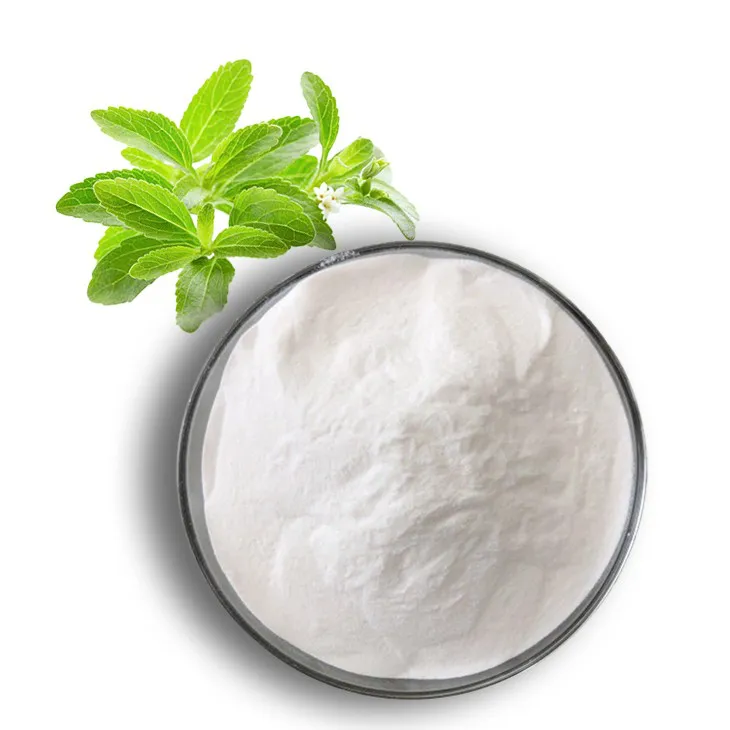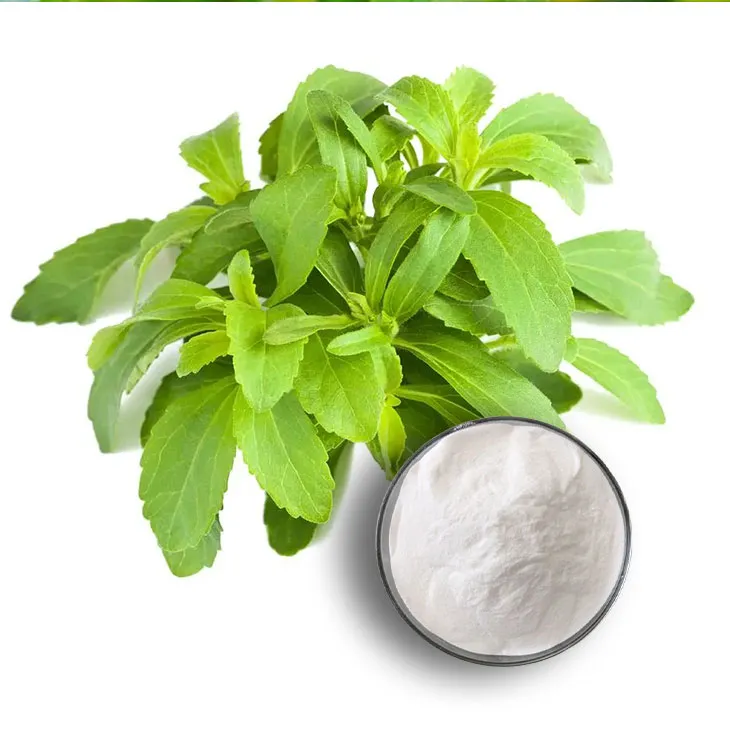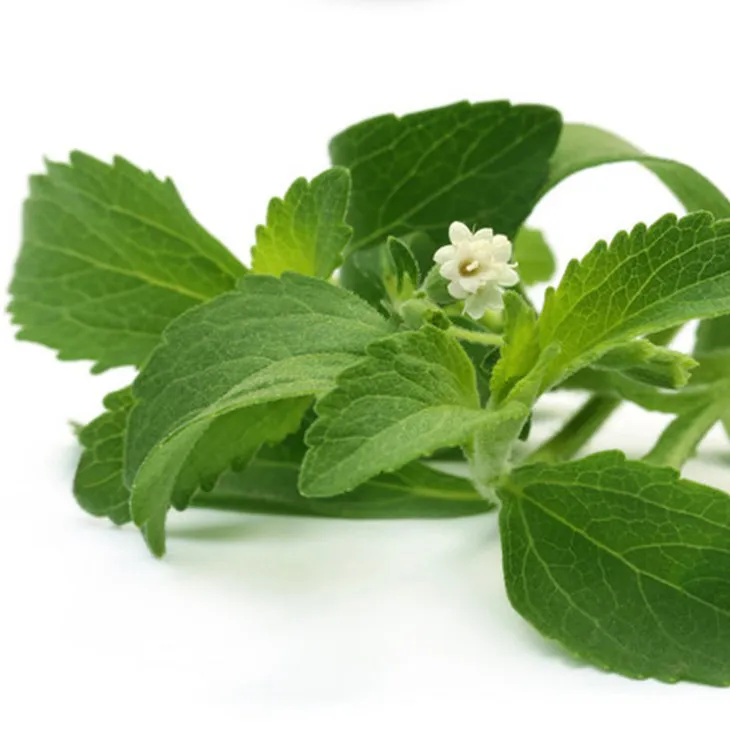- 0086-571-85302990
- sales@greenskybio.com
Organic Stevia Extract Powder Suppliers.
2024-11-26

Introduction
Organic Stevia Extract powder suppliers are playing an increasingly important role in the global market for natural sweeteners. As the demand for healthier and more natural alternatives to traditional sweeteners rises, these suppliers are at the forefront of providing high - quality stevia products. Stevia, a plant - based sweetener, has gained popularity due to its zero - calorie nature and its potential health benefits. Organic Stevia Extract powder suppliers are not only meeting the market demand but also driving innovation and promoting the use of this natural sweetener in various industries.

Quality and Certification
High - Quality Standards
One of the main aspects that set these suppliers apart is their focus on quality and obtaining relevant certifications. High - quality organic Stevia Extract powder must meet strict standards for organic content, purity, and safety. Suppliers often invest in quality control laboratories to test their products at every stage of production. This includes testing for the presence of contaminants, ensuring the correct level of stevia glycosides (the sweet - tasting compounds in stevia), and verifying the organic origin of the raw materials. For example, in the production process, samples are taken regularly from the fields where stevia is grown, during the extraction process, and in the final packaging stage to ensure consistency in quality.
Certifications
Certifications such as USDA Organic in the United States or EU Organic in Europe not only give consumers confidence but also open up international market opportunities for suppliers. These certifications require suppliers to follow specific guidelines regarding farming practices, processing, and labeling. For instance, to obtain USDA Organic certification, stevia farmers must use only approved organic fertilizers and pesticides, and the processing facilities must meet strict hygiene and environmental standards. Suppliers must also maintain detailed records of their production processes to prove compliance. EU Organic certification has similar requirements, with an emphasis on sustainable farming and environmental protection. These certifications act as a mark of quality and reliability, allowing suppliers to enter high - end markets and attract more discerning customers.

Research and Development Support
Collaboration with Research Institutions
Suppliers are also involved in research and development activities. They collaborate with research institutions to study the properties of stevia and its potential applications. This is a crucial aspect as it helps in unlocking the full potential of stevia extract powder. For example, universities and specialized research centers often have advanced equipment and expertise in areas such as plant biochemistry and food science. By partnering with these institutions, suppliers can gain access to in - depth knowledge about stevia's chemical composition, its interaction with other substances, and ways to optimize its extraction and purification processes.
Enhancing Stability and Exploring Health Benefits
This includes exploring new ways to enhance the stability of the extract in different formulations, as well as investigating the health - promoting aspects of stevia. Stability is a key factor, especially when stevia extract powder is used in products such as beverages or processed foods. Suppliers are researching methods to prevent degradation of the stevia glycosides over time, under different storage conditions, and in the presence of other ingredients. Regarding health benefits, there is ongoing research into stevia's potential role in blood sugar regulation, its antioxidant properties, and its impact on gut health. By investing in R & D, suppliers can stay ahead in the competitive market and offer more value - added products. For instance, a supplier might develop a new formulation of stevia extract powder that has enhanced stability and can be used in a wider range of products, or a product that is specifically targeted towards consumers with diabetes due to its potential blood - sugar - regulating properties.

Customer Service and Technical Support
Technical Support in Key Industries
Good customer service is another key factor for organic stevia extract powder suppliers. They need to provide technical support to their customers, especially in industries where precise formulation is crucial, such as the food and beverage and pharmaceutical industries. In the food and beverage industry, for example, the taste and texture of the final product can be significantly affected by the type and amount of sweetener used. Suppliers should be able to answer questions about product usage, dosage, and compatibility with other ingredients. They might provide guidelines on how much stevia extract powder to use to achieve a desired level of sweetness without affecting the overall flavor profile of a food or beverage product. In the pharmaceutical industry, stevia may be used in certain medications or dietary supplements, and suppliers need to ensure that it meets the strict quality and safety requirements of this sector.
Building Long - Term Relationships
This helps to build long - term relationships with customers and promotes the wider adoption of organic stevia extract powder. When suppliers are able to provide reliable technical support, customers are more likely to continue using their products and may even recommend them to others. For example, a bakery that receives excellent technical support from a stevia supplier regarding the use of stevia extract powder in their products may become a loyal customer and also influence other bakeries in their network to consider using stevia. Suppliers can also offer additional services such as customized packaging or delivery options to further enhance the customer experience and strengthen their relationships.

Supply Chain Management
Sourcing Raw Materials
Effective supply chain management is essential for organic stevia extract powder suppliers. Sourcing raw materials is the first step in this process. Suppliers need to ensure that they have a reliable source of high - quality stevia leaves. This often involves working directly with farmers, either in local regions or in international locations. They may establish long - term contracts with farmers who follow organic farming practices. For example, in some regions, stevia is grown in small - scale farms that have a reputation for producing high - quality organic stevia. Suppliers may partner with these farms to ensure a consistent supply of raw materials. They also need to monitor the quality of the stevia leaves at the source, ensuring that they meet the required standards for organic content, purity, and freshness.
Processing and Distribution
Once the raw materials are sourced, the processing stage is crucial. Suppliers need to have efficient and hygienic processing facilities to convert the stevia leaves into extract powder. This involves extraction methods that preserve the integrity of the stevia glycosides and other beneficial compounds. After processing, the distribution of the product is another important aspect. Suppliers need to have a well - organized distribution network to ensure that their products reach customers in a timely manner. This may involve working with logistics partners, both domestic and international, to manage transportation, storage, and delivery. In addition, they need to comply with all relevant regulations regarding the packaging and labeling of the stevia extract powder during the distribution process.
Market Trends and Future Outlook
Increasing Demand for Organic Products
The market for organic stevia extract powder is influenced by several trends. One of the most significant trends is the increasing demand for organic products in general. Consumers are becoming more health - conscious and environmentally aware, and they are actively seeking out products that are labeled as organic. This trend is driving the growth of the organic stevia extract powder market, as more consumers are choosing stevia as a natural and organic alternative to artificial sweeteners. For example, in the food and beverage industry, there has been a significant increase in the use of organic stevia extract powder in products such as soft drinks, yogurts, and baked goods.
Expansion into New Markets
Another trend is the expansion into new markets. Organic stevia extract powder suppliers are looking beyond their traditional markets and exploring opportunities in emerging economies. These economies often have a growing middle class with increasing disposable income and a growing interest in healthy and natural products. Suppliers may need to adapt their marketing and product strategies to suit the local tastes and regulations in these new markets. For example, in some Asian markets, there may be different preferences for the level of sweetness in products, and suppliers need to be able to offer customized solutions to meet these demands. Additionally, regulatory requirements may vary, and suppliers need to ensure that they comply with all local laws regarding the import, production, and sale of stevia extract powder.
Innovation in Product Development
Innovation in product development is also expected to drive the future of the organic stevia extract powder market. Suppliers are likely to continue investing in R & D to develop new forms of stevia extract powder, such as more concentrated or more soluble versions. This could open up new applications for stevia in industries such as cosmetics and personal care, where it could be used as a natural sweetener in lip balms or mouthwashes. There may also be research into combining stevia with other natural ingredients to create unique flavor profiles or to enhance its health - promoting properties. For example, a combination of stevia and certain herbs could be developed for use in herbal teas with added health benefits.
Challenges Faced by Suppliers
Price Volatility
Despite the positive market trends, organic stevia extract powder suppliers also face several challenges. One of the main challenges is price volatility. The price of stevia extract powder can be affected by various factors, such as changes in the cost of raw materials, fluctuations in exchange rates, and competition in the market. For example, if there is a poor harvest of stevia leaves in a major producing region, the cost of raw materials will increase, which may lead to an increase in the price of the extract powder. Additionally, fluctuations in exchange rates can impact the cost of importing or exporting stevia products, especially for suppliers who operate in international markets. Competition from other sweetener suppliers, both natural and artificial, can also put pressure on prices.
Regulatory Compliance
Another challenge is regulatory compliance. Different countries and regions have different regulations regarding the production, labeling, and sale of stevia extract powder. Suppliers need to stay updated on these regulations and ensure that they are in full compliance. For example, some countries may have specific requirements regarding the maximum allowable level of stevia glycosides in food products, or they may require certain labeling statements to inform consumers about the nature and origin of the stevia extract powder. Non - compliance can result in fines, product recalls, or even a ban on the sale of their products. This requires suppliers to invest in regulatory affairs management and stay informed about any changes in the regulatory environment.
Consumer Perception
Consumer perception is also a challenge for suppliers. Although stevia has gained popularity as a natural sweetener, there are still some consumers who may have concerns about its taste, safety, or the use of genetic modification in stevia production (even though most organic stevia is non - GMO). Suppliers need to address these concerns through effective marketing and communication strategies. For example, they can conduct taste tests to showcase the pleasant taste of stevia - sweetened products, provide educational materials about the safety and health benefits of stevia, and clearly label their products as non - GMO if applicable. Building trust with consumers is crucial for the long - term success of organic stevia extract powder suppliers.
Conclusion
Organic stevia extract powder suppliers are in a unique position in the global market for natural sweeteners. They are driving the organic sweetener revolution through their focus on quality, research and development, customer service, and supply chain management. However, they also face challenges such as price volatility, regulatory compliance, and consumer perception. By addressing these challenges and capitalizing on the market trends, suppliers can continue to grow and contribute to the wider adoption of organic stevia extract powder in various industries. As the demand for natural and organic sweeteners continues to rise, the future looks promising for these suppliers, provided they can adapt to the changing market dynamics and customer requirements.
FAQ:
What are the important factors for choosing an organic stevia extract powder supplier?
When choosing an organic stevia extract powder supplier, several factors are important. Firstly, quality and relevant certifications like USDA Organic or EU Organic are crucial as they ensure the product meets strict standards for organic content, purity, and safety. Secondly, suppliers' involvement in research and development is significant. Those who collaborate with research institutions to study stevia's properties and applications can offer more advanced and value - added products. Finally, good customer service and technical support are necessary, especially for industries requiring precise formulation, as it helps in building long - term relationships and promoting the product's wider use.
How do organic stevia extract powder suppliers ensure product quality?
Organic stevia extract powder suppliers ensure product quality in multiple ways. They often invest in quality control laboratories to test the product at every stage of production. This includes checking for organic content, purity, and safety. Meeting strict certification standards such as USDA Organic or EU Organic also indicates a high level of quality control. Additionally, continuous research and development efforts may contribute to improving product quality by exploring better extraction methods and enhancing the stability of the extract.
Why is research and development important for organic stevia extract powder suppliers?
Research and development is important for organic stevia extract powder suppliers for several reasons. Firstly, it allows them to study the properties of stevia and its potential applications. This includes finding new ways to enhance the stability of the extract in different formulations. Secondly, researching the health - promoting aspects of stevia can give the supplier an edge in the market. By investing in R & D, suppliers can stay competitive and offer more innovative and value - added products to their customers.
What kind of customer service should organic stevia extract powder suppliers provide?
Organic stevia extract powder suppliers should provide comprehensive customer service. In industries such as food and beverage and pharmaceutical where precise formulation is crucial, they need to offer technical support. This means being able to answer questions about product usage, dosage, and compatibility with other ingredients. They should also be responsive to customer inquiries and concerns, and be able to provide information about product quality, certifications, and any relevant research findings. This helps to build trust and long - term relationships with customers.
How do certifications benefit organic stevia extract powder suppliers?
Certifications benefit organic stevia extract powder suppliers in multiple ways. Certifications such as USDA Organic in the United States or EU Organic in Europe give consumers confidence in the product's quality, as they indicate that the product meets strict standards for organic content, purity, and safety. These certifications also open up international market opportunities for suppliers, allowing them to access a wider range of customers. Additionally, having certifications can set a supplier apart from competitors and enhance their reputation in the market.
Related literature
- Organic Stevia: Production, Properties and Applications"
- "The Role of Stevia Extract in the Organic Sweetener Market"
- "Quality Control in Organic Stevia Extract Powder Production"
- ▶ Hesperidin
- ▶ Citrus Bioflavonoids
- ▶ Plant Extract
- ▶ lycopene
- ▶ Diosmin
- ▶ Grape seed extract
- ▶ Sea buckthorn Juice Powder
- ▶ Fruit Juice Powder
- ▶ Hops Extract
- ▶ Artichoke Extract
- ▶ Mushroom extract
- ▶ Astaxanthin
- ▶ Green Tea Extract
- ▶ Curcumin
- ▶ Horse Chestnut Extract
- ▶ Other Product
- ▶ Boswellia Serrata Extract
- ▶ Resveratrol
- ▶ Marigold Extract
- ▶ Grape Leaf Extract
- ▶ New Product
- ▶ Aminolevulinic acid
- ▶ Cranberry Extract
- ▶ Red Yeast Rice
- ▶ Red Wine Extract
-
Feverfew Extract
2024-11-26
-
White mustard seed extract
2024-11-26
-
Cactus Extract
2024-11-26
-
Pomegranate Extract
2024-11-26
-
Ginger Extract
2024-11-26
-
Phellodendron Extract
2024-11-26
-
Beta Carotene
2024-11-26
-
Shikonin
2024-11-26
-
Hesperidin
2024-11-26
-
Polygonum multiflorum extract
2024-11-26





















